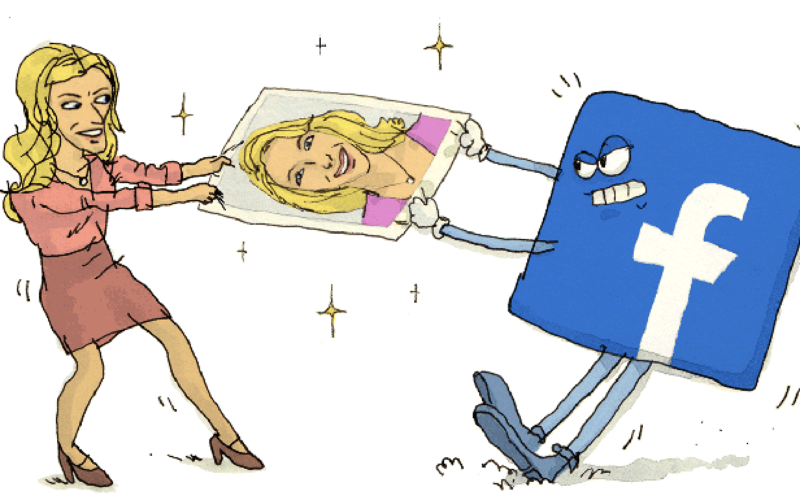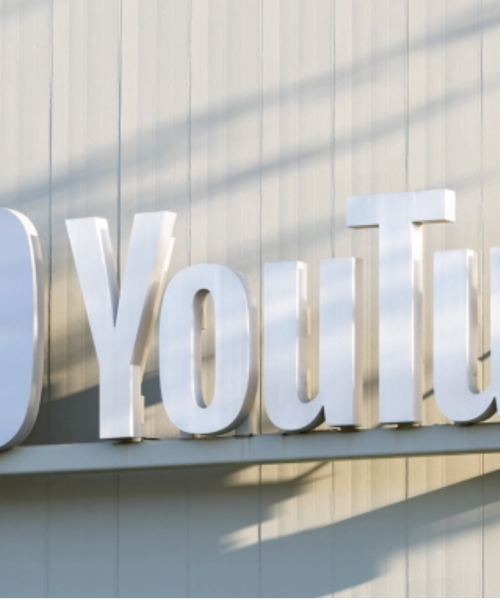BY ERIQ GARDNER | HollywoodReporter.Com
Troy Warren for CNT
A Philadelphia news anchor’s fight with digital giants, including Facebook, who hosted an unauthorized image of her in ads, raises novel questions about likeness rights and has drawn the attention of SAG-AFTRA.
As the co-anchor for Good Day Philadelphia, the local Fox affiliate’s morning news program, Karen Hepp is accustomed to hearing and seeing all sorts of crazy stuff. But nothing could prepare this TV veteran for the moment three years ago when colleagues began taking her aside to show her something remarkable: a screenshot of Hepp smiling at a hidden security camera. The image was captured at a convenience store in New York and was now being used to advertise an online dating app. Soon, Hepp would discover that her visage had spread to every dirty corner of the internet — she was the face for an erectile dysfunction cure; she had become the featured example of a “MILF” on message boards; and her image had even made it to porn sites. Hepp, a mother of three, was embarrassed and disgusted. So she acted. She sued some of the websites that were hosting the illicit image, including Facebook and Reddit. “This case is about owning your own identity,” Hepp tells The Hollywood Reporter. “It’s insulting that someone can do this and hijack your life.”
Then, she lost. In June 2020, a Pennsylvania federal judge dismissed her suit. The court’s rejection might have been eventually forgotten as yet another example of the broad immunity tech companies enjoy under Section 230 of the Communications Decency Act.
But, on appeal, Hepp’s legal campaign became provocative enough to capture the attention of SAG-AFTRA, which warned in an amicus brief that the rights of all performers could be on the line.
Hepp v. Facebook is now exploring the boundaries of the tech industry’s favorite legal shield and the nature of intellectual property — with appellate judges like Thomas Hardiman at the 3rd Circuit throwing out all sorts of challenging and somewhat humorous questions like the one he asked at a June 2 hearing in the case: “People can make a lot of money as a hand model, or so I hear. Is that intellectual property — the shape of your hand?”
Every year, thousands of individuals launch suits against social media services in an almost quixotic battle to navigate rough digital waters and recover a semblance of control over what others are posting about them online. Almost all are losing efforts. If these individuals get lucky, they might convince the site to remove objectionable content based on broken terms of service. But even that can be unsatisfactory, as many like Hepp get tired of the resulting game of whack-a-mole.
By design, the internet is a place where freedom reigns and moderation is often lacking, but another thing is also true: Policymakers have seen fit to give intellectual property holders some legal advantages when attempting to control the distribution of pirated content. That’s where Hepp v. Facebook comes into play. The local Fox star in Philadelphia is claiming that being famous is an asset and that her face is a form of intellectual property. And legal observers are paying attention to the appeal. Eric Goldman, a law professor at Santa Clara University School of Law, calls the district court’s dismissal of this case “a conspicuous outlier in Section 230 jurisprudence” before adding, “If the 3rd Circuit bases its reversal on a crazy theory, they could mess up Section 230 jurisprudence in situations far beyond the publicity rights context.”
To understand how much noise this 50-year-old news personality is making — perhaps eventually at the Supreme Court — requires some legal history. Back in the 1950s, a federal judge was examining a dispute between two companies producing baseball cards. One had signed a bunch of players to exclusive promotional contracts. The other hadn’t and didn’t care about its rival’s supposed exclusivity. “A man has a right in the publicity value of his photograph,” wrote the judge in issuing an injunction against the rogue company.
Since that ruling, many states have run with this concept by giving individuals the right to sue over commercial exploitation of their persona. And some, like Hugo Zacchini, have done just that. Nicknamed the “human cannonball,” Zacchini took on a local Ohio TV station that had broadcast his entire 15-second act. In 1977, in Zacchini v. Scripps-Howard Broadcasting Co., the U.S. Supreme Court agreed with his argument that he’d have no incentive to perform if TV broadcasters could show his act without his consent. A right of publicity law had trumped a First Amendment defense.
What specific legal claim is Hepp pursuing against Facebook, Reddit and Giphy? That’s right — the same one used by Zacchini; that these social media sites violated her right of publicity. The Good Day Philadelphia star is alleging the defendants have no right to profit off her image and likeness.
Her legal strategy might not be as potentially impactful but for an overlooked element of Section 230.
That 1996 law ensures that no interactive computer service is treated as the publisher of content contributed by users. This typically means that if Individual A tweets something defamatory about Individual B, the latter can’t hold Twitter responsible in a libel suit. Increasingly, many people are aware of Section 230 as it has become a recent target of political ire, but what’s less discussed is one of the exceptions: “Nothing in this section shall be construed to limit or expand any law pertaining to intellectual property.”
This limitation means a digital network can’t use Section 230 to escape a claim for hosting pirated movies, songs or other creative works of authorship. (The Digital Millennium Copyright Act, another mid-’90s statute, would spell out rules for ISPs with respect to such works.)
It raises novel questions ripe for discussion in the digital age. What else counts as intellectual property? And do right of publicity claims beat Section 230 immunity as an exempted form of IP?
SAG-AFTRA sure hopes so. The guild cares deeply about the exploitation of its members and has been lobbying for more robust publicity right laws around the nation to guard against phenomena like deep fakes.
“At any given point of time, there are tens, if not hundreds of thousands of individuals, including among them actors, models, athletes, spokespersons, and countless other professionals who are actively making, or are attempting to make, a career and living through the use of their names, likenesses, images, reputations and personas in a public forum,” states SAG-AFTRA’s amicus brief in the Hepp case. “The very cornerstone of their careers is their ability to exploit their rights in these intangible, but often very valuable, assets.”
Notably, this isn’t the first time an appeals court has wrestled with the interplay between Section 230 and right of publicity laws. In 2007, the 9th Circuit U.S. Court of Appeals took up adult publisher Perfect 10’s suit against several websites that had stolen images of its models. The reason Section 230 provided a shield against right of publicity claims, the 9th Circuit then concluded, was that Congress had only carved out federal intellectual property laws (right of publicity laws are state laws).
But Section 230 only says “any law pertaining to intellectual property,” not “any federal law,” and, at the 3rd Circuit’s June 2 hearing, Facebook confronted judges who teased a potentially more expansive exemption to its immunities.
“The most natural reading is that [exemption] only applies to federal [IP] law,” said Kirkland & Ellis partner Craig Primis, who’s representing the social media giant. “As [late U.S. Supreme Court] Justice [Antonin] Scalia often said, Congress doesn’t put elephants in mouseholes, and this would be an elephant of allowing analogous torts in through the intellectual property section.”
Hardiman shot back, “It’s a little bigger than a mousehole. The word ‘any’ is pretty big. You want us to replace ‘any’ with ‘federal.’ “
Third Circuit Judge Peter Phipps echoed the sentiment, adding, “It’s weird if states actually can make intellectual property laws and then we read this to say those aren’t in play.”
As a fallback, Facebook and the other websites being challenged by Hepp are arguing that right of publicity claims aren’t intellectual property at all but are rather a species of privacy law. This provokes a discussion that falls somewhere between a law review article and a feature in Cosmopolitan.
On one hand, many states now allow individuals to bequeath their rights of publicity to descendants. Think about the estates of celebrities and how they are now profiting off licensed images of dead stars in everything from T-shirts to holograms. That sure sounds like intellectual property. And if there’s any doubt, the Supreme Court in Zacchini wrote how right of publicity guarded the “proprietary interest of the individual” and was “closely analogous to the goals of patent and copyright law, focusing on the right of the individual to reap the reward of his endeavors and having little to do with protecting feelings or reputation.”
But then again, give it some thought — and it becomes rather strange to treat one’s face as something akin to a Bob Dylan song, a Martin Scorsese movie or a Milan Kundera novel.
“Isn’t it more like intangible property?” asked Phipps at the hearing. “What about it is intellectual?”
Vera Ranieri, a lawyer at Durie Tangri representing Reddit, agreed. “[Hepp’s] name and likeness exist without any creativity,” she argued. “I have a right of publicity. You have a right of publicity. We all have this right without needing to engage in any intellectual labor.”
Is that argument enough to save tech companies from the Section 230 exemption? Time will tell; a ruling from the 3rd Circuit probably won’t come for many months.
But upon further reflection, Phipps may have given a hint to his thinking when he mused, “Isn’t some creativity or intellect inherent in every person’s likeness?” He continued: “I mean, everyone tends to pick the clothes they wear, the haircut they get, things like that. Other people work much more on their posture. On some level, it strikes me that inherent in every type of presentation, there’s some degree of creativity or intellectual operation.”
In Other NEWS


































